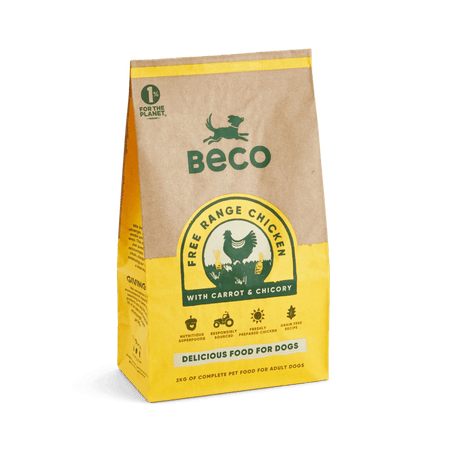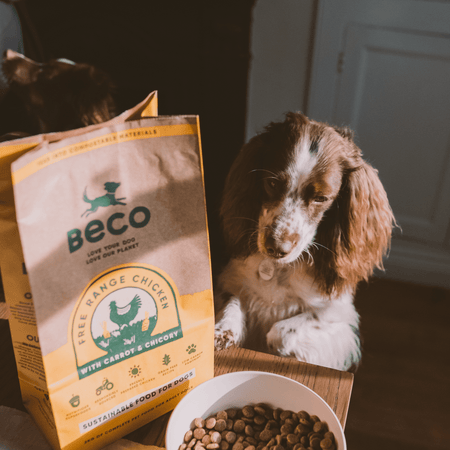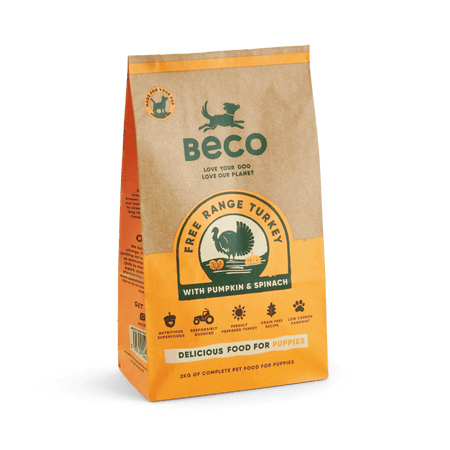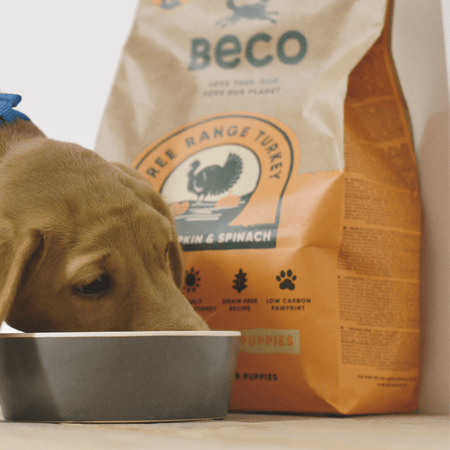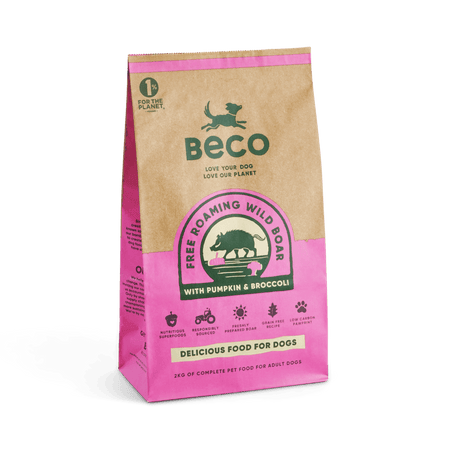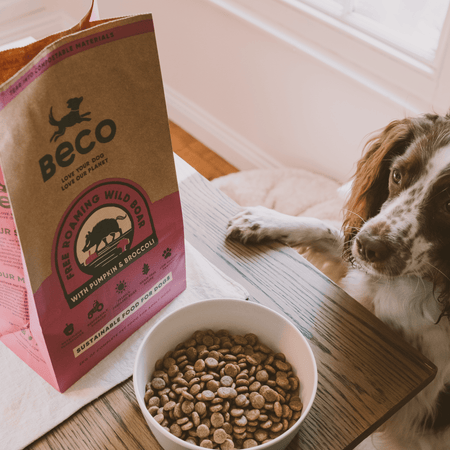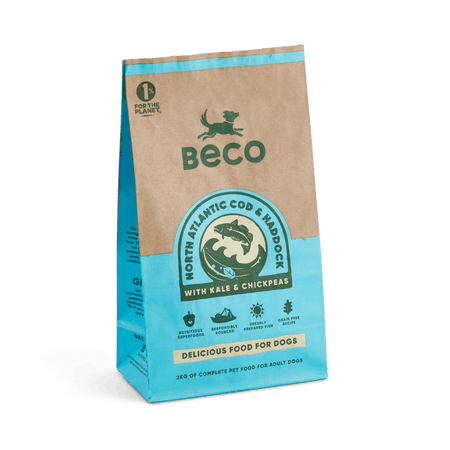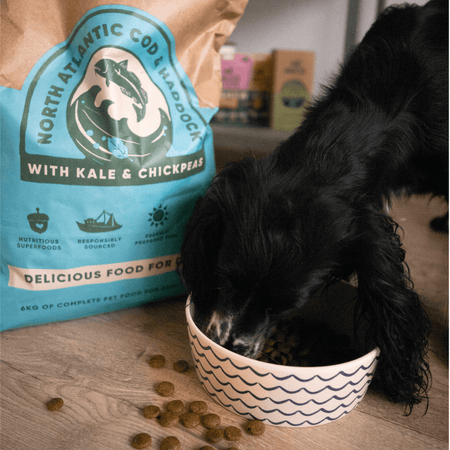Unfortunately, we tend to only learn about our dog’s stomach after we encounter some mishaps. You may wake to an unpleasant smell, or come across a poop-shaped present after a night apart. These are the tell-tale signs. Without them, it’s tough to tell when somethings up.
Sensitive stomachs are very common among dogs. Just like us, dogs’ digestive systems disagree with a lot of the things they eat - hard to believe when you consider how quickly they guzzle up their food.
The issue is: how do we know? Is your dog’s upset stomach something more serious, or is it a temporary bug, or something they’ve eaten when you’re not looking? As a dog owner, making that decision to switch your dog’s diet is tricky if you’re not entirely sure.
That’s probably why you’re here, reading this blog. So, let’s get started. We’ve pulled together all the things pet parents need to know about sensitive stomach dog food. After reading this, you should have a much clearer idea of whether your dog needs to make the switch.
What is Sensitive Stomach Dog Food?
The clue is in the name. This type of food is designed for dogs who have sensitive stomachs, it’s basically dog food that’s easy to digest. It consists of highly digestible and natural high quality ingredients. That’s because these are far more gentle on your dog’s digestive tract.
Food with high quality, sensitive stomach ingredients is always a safer bet. They’re much less likely to contain processed and unnatural ingredients and nasty chemicals that can upset a lot of dogs. These types of food are sometimes a bit more expensive, but we think our dogs deserve the best. Good quality food guarantees this.
Does my dog have a sensitive stomach?
The most common ways to tell if your dog has a sensitive stomach include signs of consistently loose and messy stools, diarrhoea or feeling of nausea. Other tell-tale signs include:
Your dog vomiting frequently
Excessive gas and flatulence - the smell will let you know
Loss of appetite
As mentioned, there’s no pleasant way to find out whether your dog has a sensitive stomach - and you’ll often have no choice if and when you do find out their stools.

If your dog is experiencing severe levels of these symptoms, then we advise you consult your vet as soon as you can. If it appears to be nothing too serious, then maybe switching to sensitive stomach food for dogs is worth considering.
What are the causes of a sensitive stomach?
A sensitive stomach can be caused by a number of factors. Unfortunately, for some dogs it can be something they inherit, which means owners have to source sensitive stomach puppy food right from the start of puppyhood.
A sudden change of diet may also be the reason behind your dog’s upset stomach. This is common. As dog owners, we’re always looking for the best food for our dogs. That’s great, but the more frequently we change our dogs’ diets, the less time they have to get used to the ingredients. Once you find a bag of food your dog likes, try sticking with it.
For many dogs, some ingredients just don’t sit well. Certain types of meat can play havoc and dogs can quickly develop allergic or intolerant reactions. That’s why plenty of owners opt to buy hypoallergenic dog food - designed specifically for those with allergies or intolerances. Grains are also known to be particularly difficult for some dogs to digest.

Despite this, you’ll still find them in many commercial, mass-market bags of dog food. That’s because grains are predominantly cheap fillers - cost effective but lacking in nutritious value. You can discover more about grains and our dog foods in our ultimate guide to grain-free dog food.
For other dogs, a sensitive stomach may be triggered by something that’s out of our control. Things like worms and bacterial infections can sneak their way into our dog’s food - or stuff they’ve eaten elsewhere.
Dog breeds prone to sensitive stomachs
Unfortunately some breeds are considered more likely than others to suffer with a sensitive stomach.
Some breeds most commonly associated with stomach sensitivity are:
Boxers
Shih Tzus
Labradors
Great Danes
Yorkshire terriers
Irish setters
Of course, any breed can suffer from a sensitive stomach, if you think your dog may be having an issue we recommend a visit to your vet to get some professional advice
How do you treat a sensitive stomach?
It’s always a good idea to consult your vet, if you’re worried your dog is suffering from a sensitive stomach. They’ll be able to identify the problem and point you in the right direction, whether that’s the right medicine or changing your dog’s diet.
Before talking to your vet, there are a number of things you can do to get an idea of the problem. These include:
Cutting out all potential causes that we as owners can manage, like feeding them scraps from the table and giving them treats - this rules out any external triggers and narrows down the problem to your dog’s regular diet
Now it’s time to work out what’s up with their diet:
Opt for dog food with moderate fat content
Choose one that has fewer and natural ingredients - again, this helps narrow down the potential issue
Buy food with a single protein source
Try going grain-free
Choose food that hasn’t been so heavily processed
It’s also worth noting that dogs sometimes make themselves feel ill when they eat their food too quickly. To find out if this is the case, divide their food into smaller portion sizes. If their sensitive stomach goes away, this may well be a long-term adjustment you have to make at dinner time.
What to feed a dog with a sensitive stomach?
The food you should feed a dog on a sensitive stomach includes boiled plain rice, and cooked chicken. Although, if your dog's sensitive stomach is an ongoing problem, then look for a long-term option like a sensitive stomach kibble or wet dog food.
What is the best dog food for sensitive stomachs?
Once you’ve identified that your dog has a problem with their stomach, it’s time to start sourcing a type of food that agrees with them and still provides them with enough nutritious value and all the energy in the world. But what food is best for this?
Food that’s easy to digest
As you know, there are plenty of things out there that can upset their stomachs. It’s, therefore, our job as owners to buy food that gives our dogs the best chance of healthy digestion. As mentioned before, high quality ingredients is one way to guarantee this.
Low in fat
While dogs have short acidic digestive tracts - which allow them to digest animal fat quickly - they should not be allowed to eat too much of it. Too much fat can lead to serious stomach issues, like pancreatitis. Just like us, dogs need to be fed things in moderation.
Grain-Free
Dogs are carnivores and if you look back at their ancestors, they ate predominantly meat-based diets. Of course, in the wild dogs did consume some grains, notably those in the stomachs of their prey. But they were never designed to eat grains alone. That’s why many struggle to digest commercial bags with such high grain content - sometimes 50/50 alongside the protein source.
At Beco, we know how temperamental dogs’ stomachs can be. That’s why we’ve created a diverse and delicious range of grain free dry dog food for sensitive stomachs, all of which are easy to digest and great for dogs with digestive problems. Our puppy food is also a fantastic option for puppies with sensitive stomachs.
There’s a fine balance when it comes to what we feed our dogs. Ensuring you buy a healthy, nutritious, digestible and stomach friendly bag for an affordable price is sometimes hard. But they are out there - you’ve just got to look a little more closely. Like all things to do with our dogs, we should always give our best shot to give them the best chance.














